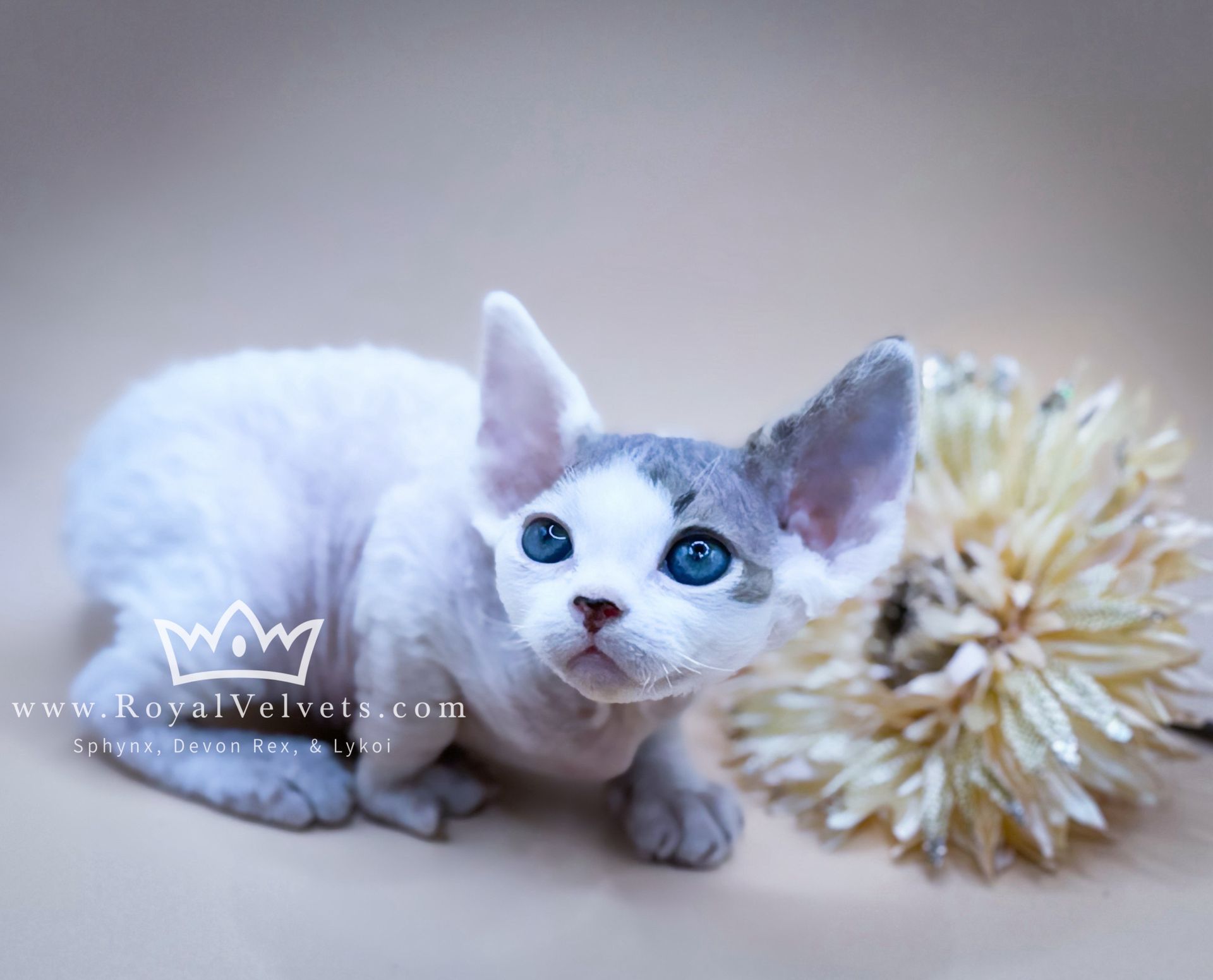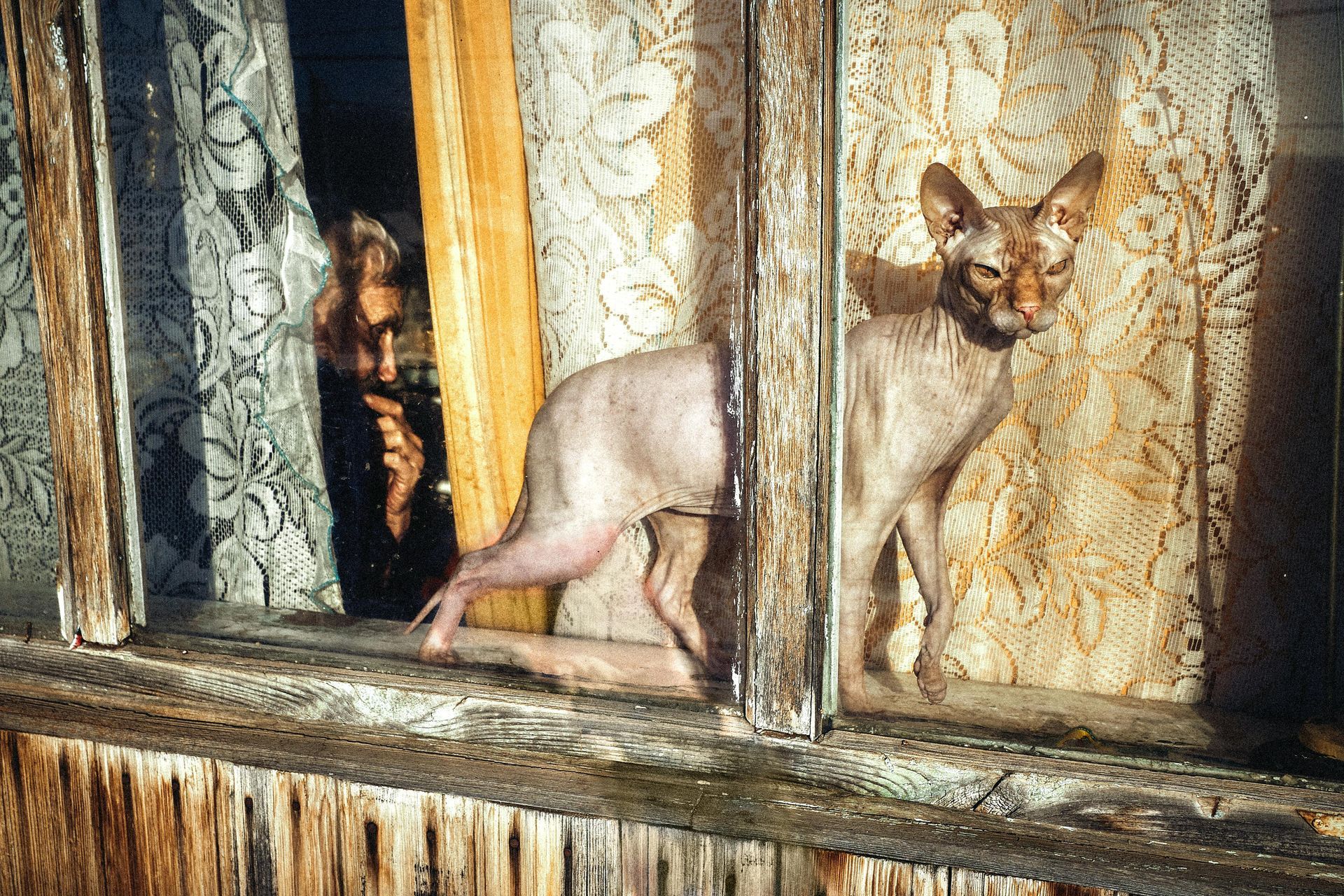Owning a cat, especially breeds as unique and captivating as the Sphynx, Lykoi, and Devon Rex, comes with its joys and challenges. One such challenge is understanding the health risks these felines might face. Like all cats, these breeds can be susceptible to certain viral infections. Being aware of these potential threats is crucial not only for the well-being of the cat but also for the peace-of-mind of the owner.
With their distinct appearances and personalities, the Sphynx, Lykoi, and Devon Rex have garnered much love worldwide. However, with this love comes the responsibility of ensuring their health and longevity. This article dives deep into some of the common viruses these breeds might encounter and offers insights into handling and preventing these infections.
As we proceed, remember that informed care and timely interventions can make all the difference in ensuring a healthy and happy life for these wonderful companions. Since kittens are not born with natural specific (adaptive) immunity - it’s critical that they remain with their mothers to receive a temporary immunity - by way of colostrum - produced in the first few days of mothers milk. It is thought that this temporary immunity starts to decline around week 5. That’s why it is very important to start vaccinating against these diseases starting around week 8. Vaccine schedules may vary, depending on the manufacturer and veterinary advice. But purchasing a kitten from a reputable breeder and working closely with your vet will ensure the best protection. Vaccines work by stimulating the immunity to develop specific immunity. Though, like most human vaccines - they are also not 100% protection against some of these viruses. It does, however, lessen the severity of disease while also providing enough protection to help fight off these foreign invaders. Here at Royal - we work very closely with our vet clinic and our kittens have all age appropriate vaccines prior to leaving for their new homes.
Feline Leukemia Virus (FeLV)
Feline Leukemia Virus, commonly known as FeLV, is one of the most widely recognized and potentially deadly viruses in cats. It's a retrovirus, which means it can insert copies of its own genetic material into the cells it infects. Over time, this can lead to a multitude of health problems, ranging from cancer to various blood disorders.
How does FeLV affect Sphynx, Lykoi, and Devon Rex breeds?
While FeLV can infect cats of any breed, age, or gender, the way it manifests might differ. The unique genetic makeup of Sphynx, Lykoi, and Devon Rex might influence their susceptibility or response to the virus. However, it's essential to remember that environment, age, and overall health often play a more significant role than breed alone.
Symptoms
FeLV is a bit of a shape-shifter when it comes to symptoms. Some cats might show signs such as lethargy, weight loss, poor coat condition, and fever, while others may seem perfectly healthy. Other possible symptoms include respiratory issues, digestive problems, or even reproductive complications.
Prevention and Treatment
The best defense against FeLV is prevention. Though the FeLV vaccine is not a core vaccine, and typically only recommended for outdoor cats, it is still a good idea to discuss the pros and cons of the vaccine with your vet and then decide what's best for your particular cat and situation. Regular vet check-ups and screenings can also help catch the virus early, improving the prognosis. If a cat is diagnosed with FeLV, treatment will focus on managing symptoms, preventing secondary infections, and enhancing their quality of life.
Considering the implications of FeLV, it's crucial for potential and current cat owners, especially those enamored by the Sphynx, Lykoi, or Devon Rex breeds, to be well-informed. Remember, early detection, prevention, and care are vital.
Interested in adopting a feline friend who has been thoroughly screened for such health concerns? Explore our kittens, at Royal Velvets health and happiness go hand in hand.
Feline Herpes
Feline Herpes, scientifically known as Feline Herpesvirus 1 (FHV-1), is one of the prevalent viral infections that can affect cats including the charming breeds of Sphynx, Lykoi, and Devon Rex. The virus chiefly targets the respiratory system, but its symptoms can manifest in multiple ways, sometimes making it a bit tricky to diagnose. It is said that 99% of all cats have or have had Feline Herpesvirus 1 at some point in their life. Kittens seem to be at most risk. So that's why it is so important to continue vaccine protocols all through their life - as suggested by your vet. And to try to keep your kitten as relaxed and stress free as possible.
How does Feline Herpes affect Sphynx, Lykoi, and Devon Rex breeds?
The unique physical attributes of Sphynx, Lykoi, and Devon Rex breeds don’t particularly predispose them to Feline Herpes, but like other cats, they are susceptible. The virus can cause respiratory distress and other discomforts that can affect their quality of life. The local climate of Nashville, TN, may also play a role in the transmission and impact of the virus.
Symptoms
The symptoms of Feline Herpes include but are not limited to:
- Sneezing and nasal discharge
- Conjunctivitis (inflammation of the eye) and discharge from the eyes • Corneal ulcers
- Fever
- Depression or lethargy
- Loss of appetite
Recognizing these symptoms early can pave the way for a timely intervention, alleviating the discomfort faced by your beloved feline companion.
Prevention and Treatment
Preventing Feline Herpes chiefly revolves around minimizing exposure to infected cats & continuing their vaccine regime. However, in a multi-cat environment or a cattery, managing exposure can be challenging. Here are some steps you can consider:
- Vaccination: Consult with your vet about the Feline Herpes vaccine to provide your cat with immunity against the virus.
- Hygiene: Maintain a clean and hygienic environment to reduce the risk of virus transmission.
- Stress Management: Stress can trigger a herpes outbreak; hence, keeping your cat’s environment calm and comfortable is essential.
- Lysine Supplements: Consult with your vet about Lysine supplements which may help in managing the symptoms of Feline Herpes.
Treatment, on the other hand, focuses on alleviating the symptoms, as there's no cure for Feline Herpes. Antiviral medications, eye drops, and antibiotics to control secondary bacterial infections can be part of the treatment plan. Your vet may also recommend supportive care like fluid therapy if your cat is severely affected.
Caring for a Sphynx, Lykoi, or Devon Rex cat is a rewarding experience, and understanding the health challenges they might face is part of the journey. If you need guidance on managing or preventing Feline Herpes in your feline companion, we're here to help. Reach out to us for expert advice, and let’s ensure your cat enjoys a healthy and vibrant life. Explore our world where the health and happiness of our feline companions are our top priority.
Feline Immunodeficiency Virus (FIV)
Often referred to as the 'Feline AIDS' due to its similarities with the human HIV, Feline Immunodeficiency Virus (FIV) is another significant viral infection that cat owners should be aware of. The virus attacks the cat's immune system, making it challenging for the feline to fight off other infections. This virus is usually only a concern for outdoor cats or indoor/outdoor cats, but it's important to still be aware of the risks. Sphynx, Lykoi, & Devon Rex are strictly indoor cats and should not be allowed outside to free roam.
How does FIV manifest in Sphynx, Lykoi, and Devon Rex cats?
All cat breeds, including our stars, the Sphynx, Lykoi, and Devon Rex, are susceptible to FIV. It's typically transmitted through bite wounds, which means that male outdoor cats often have a higher risk due to territorial disputes. It's essential to be vigilant and take preventive measures, regardless of the breed.
Symptoms
The initial signs of FIV are often subtle and might go unnoticed. Over time, a cat infected with FIV may develop chronic dental problems, recurrent skin, urinary, or respiratory infections due to their weakened immune system. Progressive weight loss and a deteriorating coat condition are also indicators.
Measures to Prevent and Manage
One of the most effective measures against FIV is neutering, especially if your cat is male and has outdoor tendencies. This will reduce the likelihood of fights and bite wounds. There's also a vaccine available, though it's not without controversy, so discuss with your vet the best preventive measures. For cats diagnosed with FIV, keeping them indoors, regular vet check-ups, and a balanced diet are crucial to ensure a healthy life.
Note: All of our kittens are placed already spayed and neutered.
A well-informed owner can provide a loving and caring environment for their feline friend, ensuring they lead a happy life regardless of the challenges they might face.
Looking for a new feline family member? At Royal Velvets, our cats are nurtured with love, and their health is our top priority. Explore the joy of adopting a cat that's been given the best start in life.
Feline Infectious Peritonitis (FIP)
Feline Infectious Peritonitis, or FIP, is caused by a mutation of a feline coronavirus. While most strains of this coronavirus are relatively harmless, some mutations can lead to the deadly disease known as FIP. It's a complex disease that has been a challenge for veterinarians to understand fully. It is thought that 99% of all cats have or have been exposed to FIP at some point in their life.
How is FIP relevant for Sphynx, Lykoi, and Devon Rex cats?
No specific breed, including the Sphynx, Lykoi, or Devon Rex, has been found to be more susceptible to FIP than others. However, it's worth noting that cats in densely populated environments, like catteries or shelters, might be at a slightly increased risk.
Symptoms
FIP can manifest in two forms: wet (effusive) and dry (non-effusive). The wet form is characterized by fluid accumulation in the abdomen or chest, leading to breathing difficulties or a bloated appearance. The dry form can be more elusive, with symptoms ranging from weight loss, depression, anemia, and fever, to inflammation of various body tissues.
Prevention and Management
The primary prevention method for FIP is ensuring a clean environment for your cat, especially if you're bringing a new kitten into your home. Regular vet check-ups can also play a pivotal role in early detection. While historically FIP was considered fatal, recent advancements in treatments show promise, making early detection even more crucial.
Though not yet available for use legally in the United States, the GS-441524 trial drug has made promising results in treating and curing FIP.
Ensuring that your feline companion is well-taken care of, regularly checked, and living in a clean environment can reduce the risks associated with such viruses.
At Royal Velvets, we prioritize the well-being of our cats, ensuring they are raised in pristine conditions and undergo regular health checks. Join our family of satisfied and happy cat parents by exploring our available kittens.
Feline Panleukopenia (FPV)
Also known as Feline Distemper, Feline Panleukopenia Virus (FPV) is a highly contagious and deadly disease, especially in kittens. It targets rapidly dividing cells in a cat's body, particularly in the bone marrow and intestines.
How does FPV affect Sphynx, Lykoi, and Devon Rex breeds?
FPV is an indiscriminate virus, impacting cats of all breeds, including our special Sphynx, Lykoi, and Devon Rex. The virus is resilient and can survive in the environment for years, making vaccination an essential preventative measure for all cats, regardless of breed or living conditions.
Symptoms
Symptoms can be rapid and severe, including high fever, lethargy, sudden weight loss, vomiting, and severe diarrhea. As it progresses, it can lead to dehydration and anemia. In kittens, the virus can even impact the development of the cerebellum, causing neurological symptoms.
Prevention and Treatment
Vaccination remains the gold standard for prevention. Regular cleaning and disinfection of living areas can also help reduce the risk. If diagnosed early, supportive care, including hydration and antibiotics to prevent secondary bacterial infections, can help increase survival rates.
Knowledge is power. By being informed and taking the necessary preventive steps, you can protect your precious feline from such threatening diseases.
At Royal Velvets, every kitten is vaccinated and given a thorough health check to ensure they get the best start in life. Dive into our world of healthy and joyful kittens awaiting their forever homes.
Wrapping Up
Every cat owner knows that a feline friend is more than just a pet – they're family. The Sphynx, Lykoi, and Devon Rex breeds, with their unique appearances and personalities, have captured the hearts of many. As a responsible cat parent, understanding common viral threats can make a world of difference in ensuring a long, healthy life for your feline companion.
While these viruses might seem daunting, the right knowledge and proactive steps can prevent most of them. From regular vet check-ups, vaccinations, and maintaining a clean environment, to understanding the symptoms and early detection, you can shield your cat from potential health concerns.
As you embark on this journey of feline companionship, remember to always prioritize their health and well-being. In doing so, the bond you share with your furry friend will only grow stronger, filled with countless purrs and cuddles.
Ready to welcome a new feline into your life? At Royal Velvets, we've got your back. From health checks to guidance on cat care, you're not just
adopting a kitten – you're joining a community that cherishes every purr and whisker twitch.


